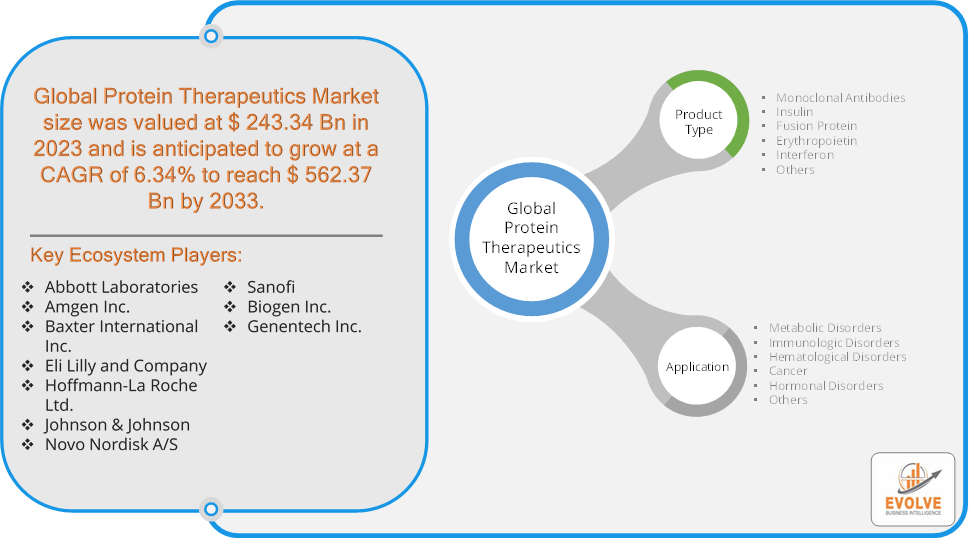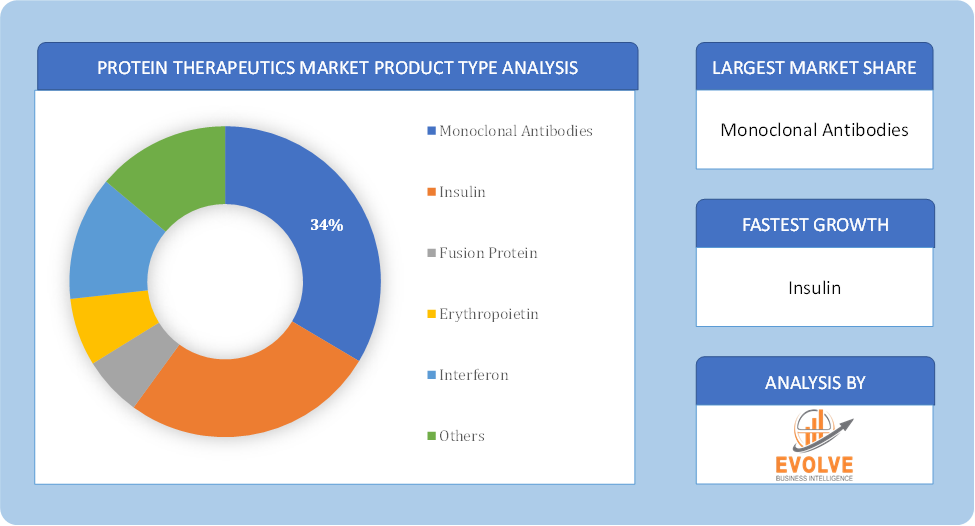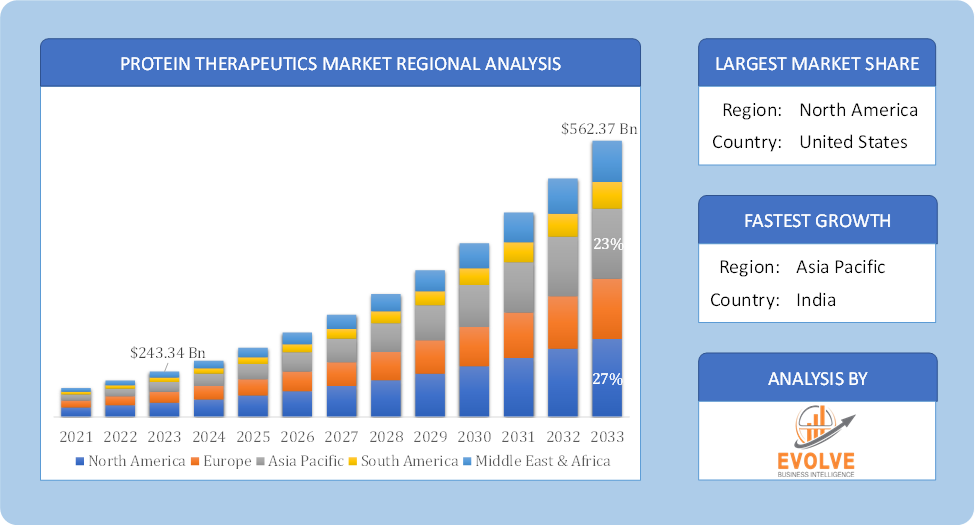Protein Therapeutics Market Overview
The Protein Therapeutics Market Size is expected to reach USD 562.37 Billion by 2033. The Protein Therapeutics Market industry size accounted for USD 243.34 Billion in 2023 and is expected to expand at a compound annual growth rate (CAGR) of 6.34% from 2023 to 2033. The Protein Therapeutics Market refers to the global industry focused on the research, development, manufacturing, and commercialization of protein-based drugs used for therapeutic purposes. Protein therapeutics are proteins engineered in the laboratory for pharmaceutical use and include a wide range of products such as monoclonal antibodies, cytokines, enzymes, insulin, and other recombinant proteins. These therapeutics are used to treat various diseases, including cancer, diabetes, autoimmune disorders, and genetic diseases.
The Protein Therapeutics Market is a dynamic and rapidly evolving sector within the pharmaceutical industry, driven by technological advancements and increasing demand for targeted and effective treatments for complex diseases.
Global Protein Therapeutics Market Synopsis
 COVID-19 Impact Analysis
COVID-19 Impact Analysis
The COVID-19 pandemic had a significant impact on the Protein Therapeutics Market. The pandemic accelerated research and development of protein-based therapeutics, such as monoclonal antibodies, for COVID-19 treatment. Products like Regeneron’s REGN-COV2 and Eli Lilly’s bamlanivimab received emergency use authorizations. The urgency to find effective COVID-19 treatments led to rapid advancements in protein engineering and production technologies. Protein-based vaccines, such as those using spike proteins, were developed, showcasing the potential of protein therapeutics in vaccine technology. The pandemic disrupted global supply chains, affecting the production and distribution of protein therapeutics due to shortages of raw materials and logistical challenges. The economic downturn caused by the pandemic led to uncertainties in healthcare spending and investment, impacting market growth projections. The pandemic highlighted the need for robust healthcare and research infrastructure, leading to increased investments in biopharmaceutical capabilities.
Protein Therapeutics Market Dynamics
The major factors that have impacted the growth of Protein Therapeutics Market are as follows:
Drivers:
Ø Advancements in Biotechnology
Advances in genetic engineering have improved the ability to produce complex proteins in large quantities, enhancing the development of new therapeutics. Innovations in protein design and engineering have enabled the creation of more effective and stable protein drugs with improved therapeutic profiles. Protein therapeutics, as biologics, offer targeted treatment with potentially fewer side effects compared to traditional small-molecule drugs, leading to increased adoption in clinical settings. Advances in drug delivery technologies, such as nanoparticle carriers and sustained-release formulations, enhance the efficacy and patient compliance of protein therapeutics.
Restraint:
- Perception of High Development and Production Costs
Producing protein therapeutics involves sophisticated and expensive biotechnological processes, making them costly to develop and manufacture compared to small-molecule drugs. High costs associated with specialized equipment and raw materials contribute to the overall expense of protein drug production. The high cost of protein therapeutics can lead to reimbursement challenges, with healthcare systems and insurers scrutinizing pricing and limiting access to these treatments. Increasing emphasis on cost-effectiveness analysis by payers can impact the adoption and market penetration of expensive protein drugs.
Opportunity:
⮚ Advancements in Protein Engineering and Biotechnology
Advances in genetic engineering, synthetic biology, and protein design enable the creation of more effective and stable protein therapeutics. Utilization of genomic data to develop targeted protein therapies tailored to individual genetic profiles. As biologics become a larger part of the pharmaceutical market, there is growing demand for innovative protein therapeutics. The rising market for biosimilars provides opportunities for developing cost-effective alternatives to existing protein therapeutics. Advancements in personalized medicine create opportunities for developing protein therapeutics that are customized to individual patient profiles, enhancing treatment efficacy.
Protein Therapeutics Market Segment Overview
 By Product Type
By Product Type
Based on Product Type, the market is segmented based on Monoclonal Antibodies, Insulin, Fusion Protein, Erythropoietin, Interferon and Others. The monoclonal antibodies segment dominated the protein therapeutics market. The dominance of the segment is attributed to the rising use of monoclonal antibodies in the treatment of various chronic diseases, which is driving the growth of the segment in the market. Monoclonal antibodies are used in the treatment of rheumatoid arthritis, cancers, systemic lupus erythematosus, multiple sclerosis, Crohn’s disease, cardiovascular diseases, psoriasis, ulcerative colitis, and rejections associated with transplantation.
By Application
Based on Application, the market segment has been divided into Metabolic Disorders, Immunologic Disorders, Hematological Disorders, Cancer, Hormonal Disorders and Others. Immunological disorders segment dominant the market. In immunological disorders, the body’s immune system doesn’t work properly the way it should work. There are certain types of immunological disorders, such as severe combined immunodeficiency (SCID) disorders, that come with the birth of a child and temporary acquired immune deficiencies. These types of immunodeficiencies come after the severe treatment of diseases like chemotherapy treatment for cancer and AIDS destroys the important white blood cells and weakens the immune system. The rising number of such is accelerating the demand for the market.
Global Protein Therapeutics Market Regional Analysis
Based on region, the global Protein Therapeutics Market has been divided into North America, Europe, Asia-Pacific, the Middle East & Africa, and Latin America. North America is projected to dominate the use of the Protein Therapeutics Market followed by the Asia-Pacific and Europe regions.
 Protein Therapeutics North America Market
Protein Therapeutics North America Market
North America holds a dominant position in the Protein Therapeutics Market. North America, particularly the United States, is a major market for protein therapeutics due to its advanced healthcare infrastructure, significant R&D investments, and high prevalence of chronic diseases. Strong presence of leading pharmaceutical and biotech companies. Efficient regulatory pathways and support for innovation and growing use of biologics and protein therapeutics in various therapeutic areas.
Protein Therapeutics Asia-Pacific Market
The Asia-Pacific region has indeed emerged as the fastest-growing market for the Protein Therapeutics Market industry. The Asia-Pacific region is experiencing rapid growth, driven by increasing healthcare access, rising disease prevalence, and growing investment in biotechnology. Expanding healthcare infrastructure and rising income levels in countries like China and India and increased focus on developing and commercializing protein therapeutics.
Competitive Landscape
The global Protein Therapeutics Market is highly competitive, with numerous players offering a wide range of software solutions. The competitive landscape is characterized by the presence of established companies, as well as emerging startups and niche players. To increase their market position and attract a wide consumer base, the businesses are employing various strategies, such as product launches, and strategic alliances.
Prominent Players:
- Abbott Laboratories
- Amgen Inc.
- Baxter International Inc.
- Eli Lilly and Company
- Hoffmann-La Roche Ltd.
- Johnson & Johnson
- Novo Nordisk A/S
- Sanofi
- Biogen Inc.
- Genentech Inc.
Key Development
In February 2024, BioNtech, a next-generation immunotherapy company, and Autolus, a clinical-stage biopharmaceutical company, announced the strategic collaboration for CAR-T Cell Therapy.
In January 2024, Ractigen Therapeutics, a leading clinical-stage pharmaceutical industry leader in charge of small activated RNA therapeutics, announced a strategic partnership with Utrecht University-affiliated University Medical Center. The collaboration strengthens the saRNA-based treatments for a spectrum of intractable neurodevelopmental disorders.
Scope of the Report
Global Protein Therapeutics Market, by Product Type
- Monoclonal Antibodies
- Insulin
- Fusion Protein
- Erythropoietin
- Interferon
- Others
Global Protein Therapeutics Market, by Application
- Metabolic Disorders
- Immunologic Disorders
- Hematological Disorders
- Cancer
- Hormonal Disorders
- Others
Global Protein Therapeutics Market, by Region
- North America
- US
- Canada
- Mexico
- Europe
- UK
- Germany
- France
- Italy
- Spain
- Benelux
- Nordic
- Rest of Europe
- Asia Pacific
- China
- Japan
- South Korea
- Indonesia
- Austalia
- Malaysia
- India
- Rest of Asia Pacific
- South America
- Brazil
- Argentina
- Rest of South America
- Middle East & Africa
- Saudi Arabia
- UAE
- Egypt
- South Africa
- Rest of Middle East & Africa
| Parameters | Indicators |
|---|---|
| Market Size | 2033: USD 562.37 Billion |
| CAGR (2023-2033) | 6.34% |
| Base year | 2022 |
| Forecast Period | 2023-2033 |
| Historical Data | 2021 (2017 to 2020 On Demand) |
| Report Coverage | Revenue Forecast, Competitive Landscape, Growth Factors, and Trends |
| Key Segmentations | Product Type, End User |
| Geographies Covered | North America, Europe, Asia-Pacific, South America, Middle East, Africa |
| Key Vendors | Abbott Laboratories, Amgen Inc., Baxter International Inc., Eli Lilly and Company, Hoffmann-La Roche Ltd., Johnson & Johnson, Novo Nordisk A/S, Sanofi, Biogen Inc. and Genentech Inc. |
| Key Market Opportunities | · Advancements in Protein Engineering and Biotechnology
· Growth in Biologics and Biosimilars |
| Key Market Drivers | · Advancements in Biotechnology
· Technological Advancements in Drug Delivery |
REPORT CONTENT BRIEF:
- High-level analysis of the current and future Protein Therapeutics Market trends and opportunities
- Detailed analysis of current market drivers, restraining factors, and opportunities in the future
- Protein Therapeutics Market historical market size for the year 2021, and forecast from 2023 to 2033
- Protein Therapeutics Market share analysis at each product level
- Competitor analysis with detailed insight into its product segment, Government & Defense strength, and strategies adopted.
- Identifies key strategies adopted including product launches and developments, mergers and acquisitions, joint ventures, collaborations, and partnerships as well as funding taken and investment done, among others.
- To identify and understand the various factors involved in the global Protein Therapeutics Market affected by the pandemic
- To provide a detailed insight into the major companies operating in the market. The profiling will include the Government & Defense health of the company’s past 2-3 years with segmental and regional revenue breakup, product offering, recent developments, SWOT analysis, and key strategies.


 Protein Therapeutics North America Market
Protein Therapeutics North America Market



